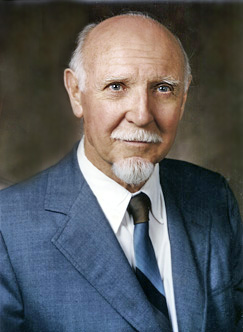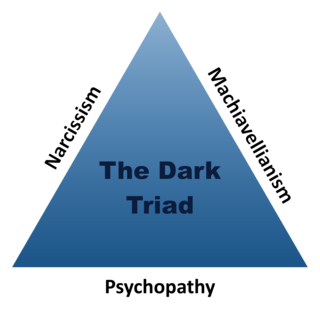Related Research Articles

Psychometrics is a field of study within psychology concerned with the theory and technique of measurement. Psychometrics generally refers to specialized fields within psychology and education devoted to testing, measurement, assessment, and related activities. Psychometrics is concerned with the objective measurement of latent constructs that cannot be directly observed. Examples of latent constructs include intelligence, introversion, mental disorders, and educational achievement. The levels of individuals on nonobservable latent variables are inferred through mathematical modeling based on what is observed from individuals' responses to items on tests and scales.

In personality typology, the Myers–Briggs Type Indicator (MBTI) is an introspective self-report questionnaire indicating differing psychological preferences in how people perceive the world and make decisions. It enjoys popularity despite being widely regarded as pseudoscience by the scientific community. The test attempts to assign a binary value to each of four categories: introversion or extraversion, sensing or intuition, thinking or feeling, and judging or perceiving. One letter from each category is taken to produce a four-letter test result, such as "ISTJ" or "ENFP".

Psychological testing is the administration of psychological tests. Psychological tests are administered by trained evaluators. A person's responses are evaluated according to carefully prescribed guidelines. Scores are thought to reflect individual or group differences in the construct the test purports to measure. The science behind psychological testing is psychometrics.

Honesty or truthfulness is a facet of moral character that connotes positive and virtuous attributes such as integrity, truthfulness, straightforwardness, along with the absence of lying, cheating, theft, etc. Honesty also involves being trustworthy, loyal, fair, and sincere.

A personality test is a method of assessing human personality constructs. Most personality assessment instruments are in fact introspective self-report questionnaire measures or reports from life records (L-data) such as rating scales. Attempts to construct actual performance tests of personality have been very limited even though Raymond Cattell with his colleague Frank Warburton compiled a list of over 2000 separate objective tests that could be used in constructing objective personality tests. One exception however, was the Objective-Analytic Test Battery, a performance test designed to quantitatively measure 10 factor-analytically discerned personality trait dimensions. A major problem with both L-data and Q-data methods is that because of item transparency, rating scales and self-report questionnaires are highly susceptible to motivational and response distortion ranging all the way from lack of adequate self-insight to downright dissimulation depending on the reason/motivation for the assessment being undertaken.
Moral psychology is a field of study in both philosophy and psychology. Historically, the term "moral psychology" was used relatively narrowly to refer to the study of moral development. Moral psychology eventually came to refer more broadly to various topics at the intersection of ethics, psychology, and philosophy of mind. Some of the main topics of the field are moral judgment, moral reasoning, moral sensitivity, moral responsibility, moral motivation, moral identity, moral action, moral development, moral diversity, moral character, altruism, psychological egoism, moral luck, moral forecasting, moral emotion, affective forecasting, and moral disagreement.
Lawrence Kohlberg's stages of moral development constitute an adaptation of a psychological theory originally conceived by the Swiss psychologist Jean Piaget. Kohlberg began work on this topic as a psychology graduate student at the University of Chicago in 1958 and expanded upon the theory throughout his life.

Raymond Bernard Cattell was a British-American psychologist, known for his psychometric research into intrapersonal psychological structure. His work also explored the basic dimensions of personality and temperament, the range of cognitive abilities, the dynamic dimensions of motivation and emotion, the clinical dimensions of abnormal personality, patterns of group syntality and social behavior, applications of personality research to psychotherapy and learning theory, predictors of creativity and achievement, and many multivariate research methods including the refinement of factor analytic methods for exploring and measuring these domains. Cattell authored, co-authored, or edited almost 60 scholarly books, more than 500 research articles, and over 30 standardized psychometric tests, questionnaires, and rating scales. According to a widely cited ranking, Cattell was the 16th most eminent, 7th most cited in the scientific journal literature, and among the most productive psychologists of the 20th century. He was a controversial figure due in part to his friendships with, and intellectual respect for, white supremacists and neo-Nazis.
This is a bibliography of books by psychologist Raymond Cattell.

General knowledge is information that has been accumulated over time through various media and sources. It excludes specialized learning that can only be obtained with extensive training and information confined to a single medium. General knowledge is an essential component of crystallized intelligence. It is strongly associated with general intelligence and with openness to experience.
Walter Mischel was an Austrian-born American psychologist specializing in personality theory and social psychology. He was the Robert Johnston Niven Professor of Humane Letters in the Department of Psychology at Columbia University. A Review of General Psychology survey, published in 2002, ranked Mischel as the 25th most cited psychologist of the 20th century.

An ink blot test is a personality test that involves the evaluation of a subject's response to ambiguous ink blots. This test was published in 1921 by Swiss psychiatrist Hermann Rorschach. The interpretation of people's responses to the Rorschach Inkblot Test was originally based on psychoanalytical theory but investigators have used it in an empirical fashion. When this test is used empirically, the quality of the responses is related to the measurements of personality.

Glenn Daniel Wilson is a psychologist best known for his work on attitude and personality measurement, sexual attraction, deviation and dysfunction, partner compatibility, and psychology applied to performing arts. He is a fellow of the British Psychological Society and makes frequent media appearances as a psychology expert, especially in TV news and documentaries.

The dark triad is a psychological theory of personality, first published by Delroy L. Paulhus and Kevin M. Williams in 2002, that describes three notably offensive, but non-pathological personality types: Machiavellianism, sub-clinical narcissism, and sub-clinical psychopathy. Each of these personality types is called dark because each is considered to contain malevolent qualities.
The Sixteen Personality Factor Questionnaire (16PF) is a self-report personality test developed over several decades of empirical research by Raymond B. Cattell, Maurice Tatsuoka and Herbert Eber. The 16PF provides a measure of personality and can also be used by psychologists, and other mental health professionals, as a clinical instrument to help diagnose psychiatric disorders, and help with prognosis and therapy planning. The 16PF can also provide information relevant to the clinical and counseling process, such as an individual's capacity for insight, self-esteem, cognitive style, internalization of standards, openness to change, capacity for empathy, level of interpersonal trust, quality of attachments, interpersonal needs, attitude toward authority, reaction toward dynamics of power, frustration tolerance, and coping style. Thus, the 16PF instrument provides clinicians with a normal-range measurement of anxiety, adjustment, emotional stability and behavioral problems. Clinicians can use 16PF results to identify effective strategies for establishing a working alliance, to develop a therapeutic plan, and to select effective therapeutic interventions or modes of treatment. It can also be used within other areas of psychology, such as career and occupational selection.
Political ethics is the practice of making moral judgments about political action and political agents. It covers two areas. The first is the ethics of process, which deals with public officials and their methods. The second area is the ethics of policy, which concerns judgments surrounding policies and laws.
Moral foundations theory is a social psychological theory intended to explain the origins of and variation in human moral reasoning on the basis of innate, modular foundations. It was first proposed by the psychologists Jonathan Haidt, Craig Joseph, and Jesse Graham, building on the work of cultural anthropologist Richard Shweder. It has been subsequently developed by a diverse group of collaborators and popularized in Haidt's book The Righteous Mind. The theory proposes six foundations:
LOTS is an acronym, suggested by Cattell in 1957 and later elaborated by Block, to provide a broad classification of data source for personality psychology assessment. Each data source has its advantage and disadvantage. Research on personality commonly employ different data source so as to represent better the pattern of one's distinctive features.

In the field of personality psychology, Machiavellianism is a personality trait centered on manipulativeness, callousness, an indifference to morality, and a strategic focus on self interest. Psychologists Richard Christie and Florence Geis named the trait after Niccolò Machiavelli, as they used edited and truncated statements inspired by his works to study variations in human behaviors. Their Mach IV test, a 20-question, Likert-scale personality survey, became the standard self-assessment tool and scale of the Machiavellianism construct. Those who score high on the scale are more likely to have a high level of deceitfulness and a cynical, unempathetic temperament.
References
- ↑ Salkind, Neil J.; Frey, Bruce B. (2022-09-26). Tests & Measurement for People Who (Think They) Hate Tests & Measurement. SAGE Publications. p. 303. ISBN 978-1-0718-1718-6.
- 1 2 Sundem, Garth (2010). Brain Candy: Science, Paradoxes, Puzzles, Logic, and Illogic to Nourish Your Neurons. Crown. pp. 14, 217. ISBN 9780307588043.
- ↑ "The Robin Hood Personality Quiz: Results | Psychology Today". www.psychologytoday.com. Retrieved 2023-09-12.